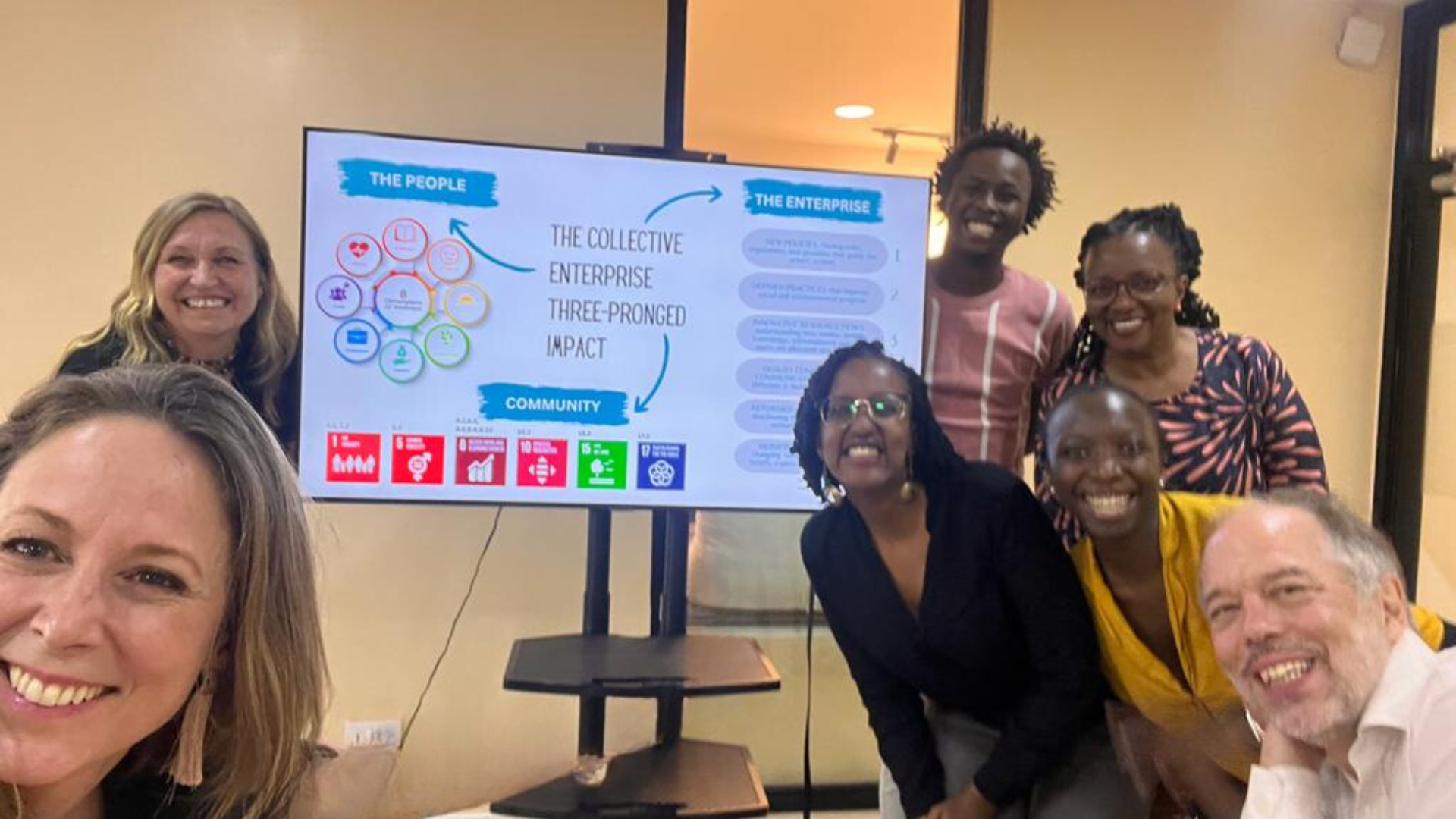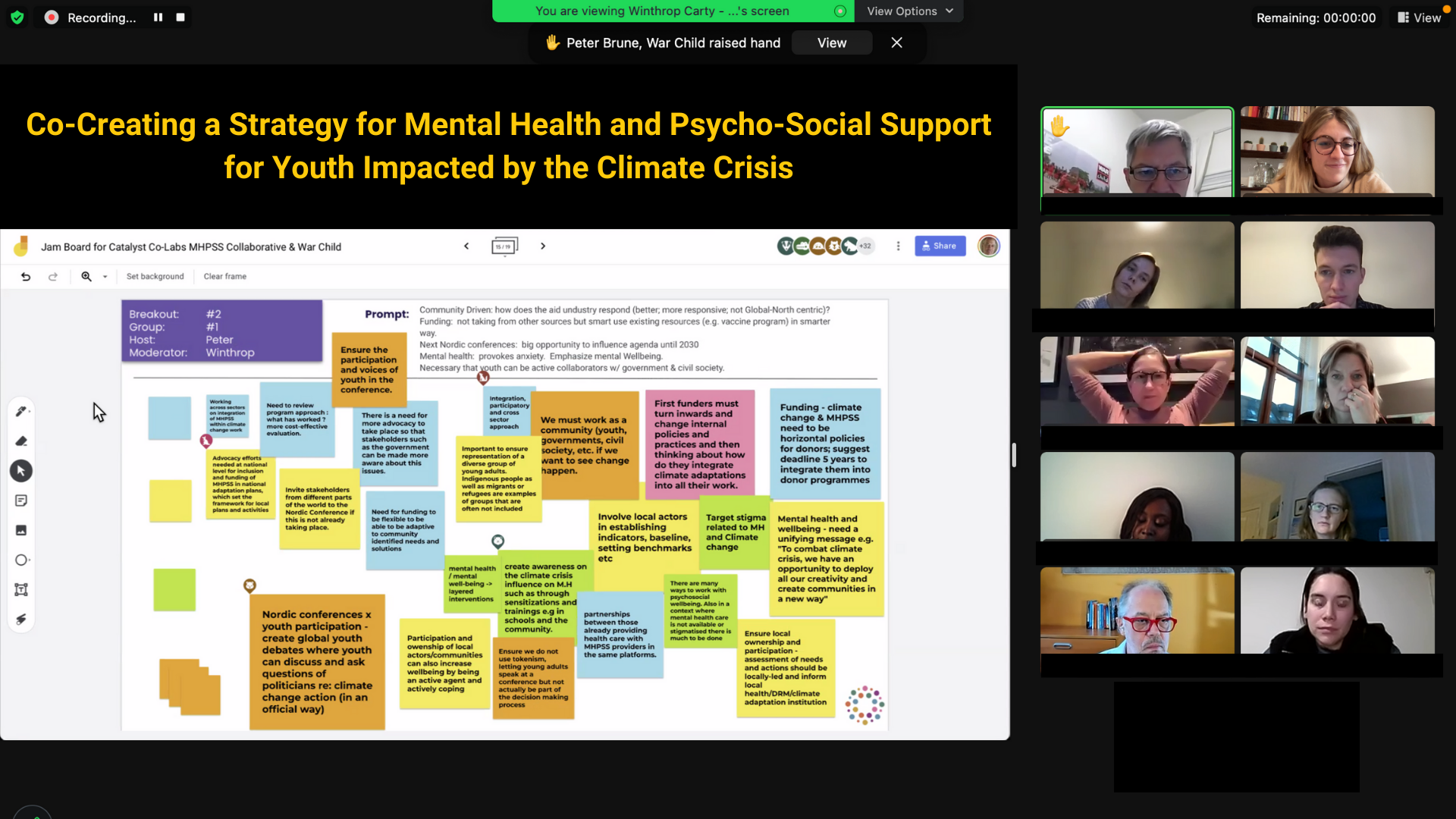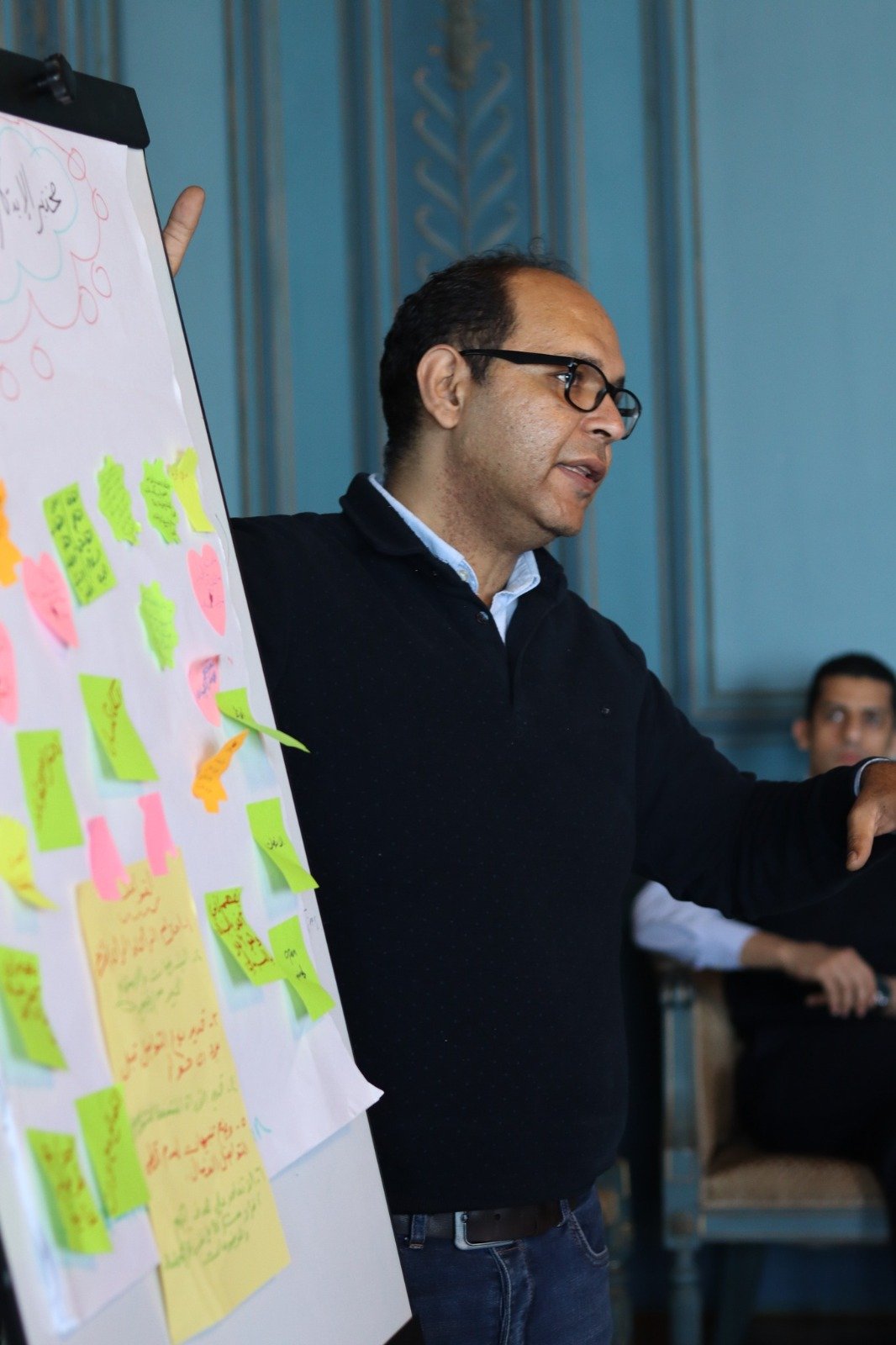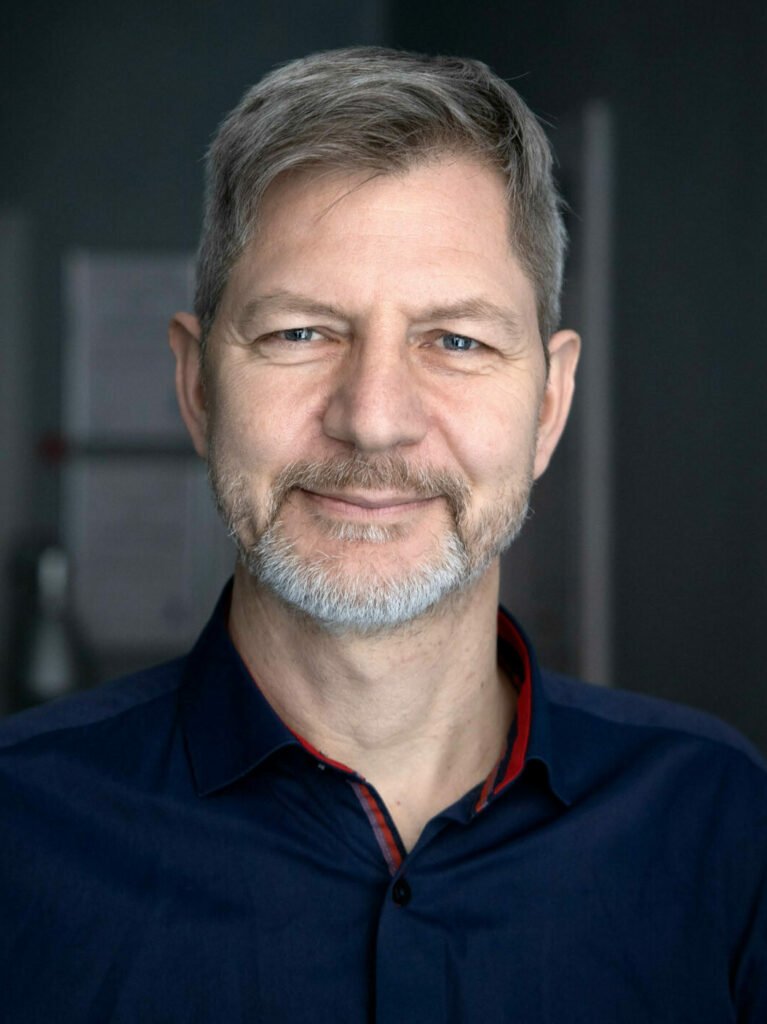
Outcomes
-
Inspiring Solutions You Can Use
This is where we share results from previous Co-Labs.
All solutions are shared free of charge, with the aim to inspire and help more social entrepreneurs overcome challenges to scale.
For deeper insights, contact us directly.

GAZA CO-LAB: We helped Yes Theater and Creativity Lab to adapt and expand their work in Gaza with children at the height of the war. Read more below.

DESH KA BAG CO-LAB: The Co-Lab sparked collaboration among several of the Co-Lab participants to develop a detailed strategy and funding proposal. Read more below.

CVPA CO-LAB: The creation and launching of the ICE Index, a three-pronged tool that measures impact at the individual, enterprise, and community levels... Read more below. encouraging a shift from isolated enterprise-centric efforts to a network of interconnected entities working together toward shared goals. The ICE Index—Individual, Community, Enterprise—reflects CVPA's focus on collaboration and co-creation for greater collective impact.

MHPSS CO-LAB: The Nordic Government and other funders were presented a case for new policies and funding for mental health and psycho-social support of youth... Read more below. impacted by climate change directly at the conference, hitting the ground running.

WE LOVE READING CO-LAB: The ideas and collaborations that emerged from this Co-Lab contributed to We Love Reading receiving support from UNESCO and to attracting... Read more below. pro bono tech development assistance to create a platform.

Opportunity Collaboration CO-LAB: The creation and promotion of a list of best practices for funder-NGO relationships. Read more below.
Co-Lab:
Education and Psychosocial Support NOW for the Children of Gaza
Co-Lab Host Mohammad Issa
The Challenge for this Co-Lab:
Since October 2023, the war has devastated an already fragile education system in Gaza, leaving over 625,000 children without access to schooling and adversely affecting their mental health. The situation has rendered 22,564 teachers jobless and has resulted in death and injuries to thousands. Infrastructure, including most schools/universities and internet services, have been destroyed.
Children are experiencing severe signs and symptoms of trauma including anxiety, fear and worry about their safety and that of their families. Caregivers are themselves stressed and struggling to help children cope.
The Challenge for this Co-Lab was to help Yes Theater and Creativity to adapt and expand their work to address the increasingly challenging situation for the children they reach in Gaza regarding mental health and education.
As local NGOs with approx. 60 staff present in shelters across Gaza, they found themselves with increasing numbers of children to help as larger NGO’s had left or had decided not to re-enter until a ceasefire. They needed help to understand if what they were doing was correct, and how to expand and adapt their programs.
The Co-Lab
For this Co-Lab we rworked with Creativity Lab to recruit 35 hand-picked experts, practitioners, and potential partners out of hundreds of applicants.
15 countries were represented across the world, combining experts and people with lived experience.
Two teachers & a psychologist from Creativity Labs described the current challenges they face.
Outcomes
The June 2024 Co-Labs provided the Hosts with a wealth of new information and resources that helped them deploy a suite of interventions to mitigate the educational disruption.
The methodologies were put to use by the staff in field directly and are currently being used in the shelters.
The Hosts are continously learning about effective methods from around the world and new approaches to childhood trauma support and informal and accelerated learning are being co-created that can be used and disseminated in Gaza.
Participants from the Co-Lab are collaborating with the Hosts on several new follow-up activities, such as developing a platform for online and offline educational material and an online educational conference.
To learn more, or if you are interested in supporting Creativity Lab/Yes Theatre, contact us!
About the Hosts: Creativity Lab for Empowerment and Education & Yes Theatre for Communication among Youth
Creativity Lab for Empowerment and Education, a non-profit organization founded by Mohammad Issa, in partnership with Yes Theatre for Communication among Youth, currently operates with over 150 teachers and psychologists across Gaza in 60 shelter centers reaching thousands of children.
Since 2016, they have engaged 350+ educators across Gaza to offer children an informal, engaging way to play through theater to begin to address their Mental Health and Psychosocial (MHPSS) challenges, reaching over 20,000 children to date. Through their lens and ongoing operations on the ground in Gaza, they see that much can be done in Gaza today.
Creativity Lab and Yes Theatre have no political or religious affiliations.
Co-Lab:
Prepare the Case to Form the Scandinavian Nations’ New Funding Policies in the Area of Climate Change and Youth’s Mental Health
Co-Lab Host Marie Dahl and Peter Brune
The Challenge for this Co-Lab:
The challenge for this Co-Lab was to expand the Nordic Nations knowledge and expertise on the quite new issue of climate-change-driven mental health and psychosocial needs of children and youth.
Since 2022, the Nordic Countries have been hosting a joint summit on Mental Health and Psychosocial Support (MHPSS) in Fragile and Humanitarian settings. The countries take turns in hosting the summit, and in March 2024 it was Sweden’s turn. Co-hosted by a consortium of Nordic MHPSS-actors together with the Ministry of Foreign Affairs of Sweden, the second summit focused on expanding the seven action areas adopted from the Copenhagen Roadmap in 2022. You can read more about the roadmap here.
In order to “hit the ground running” the first day of the conference, the goal was to come up with a set of recommendations to be submitted to Nordic policy makers and global funders and social-sector leaders at the conference, in order to achieve greater focus and funding.
The Co-Lab
For this Co-Lab we recruited 34 hand-picked experts and practitioners in mental health, youth support, climate, and disaster response.
21 countries were represented, as we focused on involving people from all over the world with real lived experience to impact future funding decisions.
Outcomes
Based on their learnings from the Co-Lab, War Child and the MHPSS Collaborative in collaboration with the Co-Lab participants, are developing the case for Nordic governments to invest more funds for MHPSS programs at the intersection of youth and climate change in fragile environments.
Continued access to youth and community voice alongside researchers and operational experts to deliver insights to drive a case for new policies and future programmatic areas for funding.
Hit the ground running at the conference with one of the most well-prepared tracks.
This is only the beginning. Stay tuned!
Do you want to get in touch with Peter or Marie for more info? We are happy to introduce. Contact us
About the Hosts: War Child Sweden & The MHPSS Collaborative
War Child Sweden
War Child works to enhance the lives of children affected by war globally through programs focusing on psychosocial support, education, and protection. Operating from Colombia to Palestine, we ensure every child's right to a stable, peaceful future. Read more here.
The MHPSS Collaborative
The Mental Health and Psychosocial Support Collaborative is an online community of practicioners dedicated to mental health and psychosocial support in challenging humanitarian and development contexts. Read more here.
Co-Lab:
Measuring Impact of a Collective Enterprise Model to Replicate and Scale Across six African Countries
Co-Lab Host Dr. Wamuyu Mahinda
The Challenge for this Co-Lab:
To measure the impact of the Collective Enterprise Model so that the organisation Collaborative Value Partners Africa (CVPA) can manage, evolve, and replicate it for impact.
The Co-Lab
This was a hybrid event, on-line and on-site in Nairobi, Kenya.
Convening over 20 hand-picked experts and practitioners locally in Nairobi and participants from 10 countries worldwide online.
Outcomes
Through two dynamic co-creation facilitated sessions, the teams identified multiple measurement approaches to track performance and impact resulting from collaboration among social enterprises, the community, private sector partners, and government.
Identification of multidimensional Collaboration metrics including: Ethics/Operating Principles, Sustainability, Shared Value (but not always equal value), Clarity of Roles, Transparency & Accountability, Shared Story/Narrative and Formal Communications. Many of the participants plan to stay involved with CVPA’s next steps as they leverage their shared learning from the Co-Lab.
Update November 2024
“We’ve launched our Framework, called ICE Index, co-developed through Co-Labs, to measure the impact of social innovators and ecosystems in our Cohort Network across Africa. As an outcome, ICE now tracks the wellness of the enterprise workforce, assesses their systems-change approach and demonstrates the social impact of the enterprises, activities and initiatives on the targeted community.”
About the Hosts: Collaborative Value Partners Africa (CVPA)
Collaborative Value Partners Africa (CVPA) utilizes the Collective Enterprise Model for African Homegrown Solutions to achieve systems change through a three-pronged impact approach targeting individuals, communities, and enterprises.
The organization currently supports 16 social entrepreneurs across six African countries.
Co-Lab:
Motivating Indian Street Vendors to Replace Plastic Bags with a Recylable Option, Battling the Plastic Bag Waste Pollution
Co-Lab Host Poonam Bir Kashturi
The Challenge for this Co-Lab
To identify and develop the incentives and technologies for street vendors to replace plastic bags with the recycled cloth shopping bag “Desh Ka Bag”.
The Co-Lab
This Co-Lab brought together 26 hand-picked experts.
10 countries represented from across the world, ranging from the head of India’s Street Vendor Association to experts in Fintech and marketing.
Outcomes
The Co-Lab sparked collaboration among several of the Co-Lab participants to develop a detailed strategy and funding proposal.
Together they identified incentives and technologies for street vendors and others in the supply chain to replace plastic with recycled bags.
According to Poonam this was a game changer.
Sadly, Poonam passed away in May, 2024. Working with her was a joy and a privilege. Poonam embodied the best of social entrepreneurship in India and beyond. With her a bright light went out far too soon, we will miss her fondly.
“Our work needed this diversity of expertise that we were able to tap into, which really is the strength of the Co-Lab connections”
About the Host: Desh Ka Bag
Desh Ka Bag is a circular, traceable, and scalable system for reducing plastic bag waste in India, focusing on small vendors. This initiative involves creating a self-funding, trackable ecosystem of recycled shopping bags to combat plastic use at its origin.
Poonam was also the founder and creator of the award winning Indian composter initiative, Daily Dump
Co-Lab:
Connecting 3,000 Community Leaders Worldwide to Promote Literacy, Education and Changes in Mindsets
Co-Lab Host Dr Rana Dajani
The Challenge for this Co-Lab
To connect over 3,000 reading ambassadors worldwide for peer support and collaboration.
The Co-Lab
In January 2021, this Co-Lab supported We Love Reading to better connect We Love Reading’s 3000 ambassadors worldwide through brainstorming and creating a peer-to-peer platform.
The Co-lab Team curated a group of 28 tech, educational design and strategy experts and practitioners.
14 countries were representet worldwide to help Rana and her organization with her challenge.
Outcomes
The ideas and collaborations that emerged from this Co-Lab contributed to:
We Love Reading receiving support from UNESCO to carry out their program across Jordan’s refugee camps
Attracting pro bono tech development assistance to create the platform
Since our Co-Lab for We Love Reading in 2020, We Love Reading has grown to 9,283 Reading Ambassadors across 71 countries!
WLR has also recently launched an online training platform, “How to Read Aloud for Children,” in English and Arabic with subtitles in 10 languages—Spanish, French, Turkish, Korean, Urdu, Hindi, Chinese, Vietnamese, and Dutch.
Asmaa Al-Rashed, a WLR Ambassador from the Zaatari refugee camp, led the “Let’s Read” project, which received support from the UN Refugee Agency Innovation Fund. Asmaa’s journey was featured in The Neighborhood Storyteller film and the children’s book Mama’s Magic.
Would you like to to get in touch with Rana for more info about the platform? Contact us
About the Host: We Love Reading
We Love Reading is a research-backed program that trains local volunteers to inspire children to read for fun. With over 3000 Reading Ambassadors globally, these community leaders read aloud to thousands of children daily, promoting literacy, education and changes in mindset., creating new changemakers.
Co-Lab:
Improve Power Dynamics between Funders and Grassroot NGOs
Co-Lab Host Opportunity Collaboration
The Challenge for this Co-Lab
To improve power dynamics between funders and grassroots nonprofit organizations.
The Co-Lab
This was an in-person Co-Lab at the annual conference Opportunity Collaboration (OC), this year held the Dominican Republic.
We delivered a two-day Co-Lab focused on addressing power dynamics between funders and local leaders. The event utilized three hosts with distinct roles—a funder, an intermediary, and a grassroots NGO—represented by Emily Mochizuki Lutyens of Common Future, Evan Cauble-Johnson of Street Business School, and Samson Wambuzi from Uganda's Yiya Solutions.
Outcomes
A decision to create and promote a list of best practices for funder-NGO relationships to be adopted by practitioner groups from OC.
Would you like to find out more about Opportunity Collaboration or get in touch? Look here or contact us.
About the Host: Opportunity Collaboration (OC)
OC is an annual “unconference” that brings together changemakers, grantmakers, investors, and others for authentic conversations around tackling poverty. One of OC’s goals is to spark collaboration among its delegates.
















